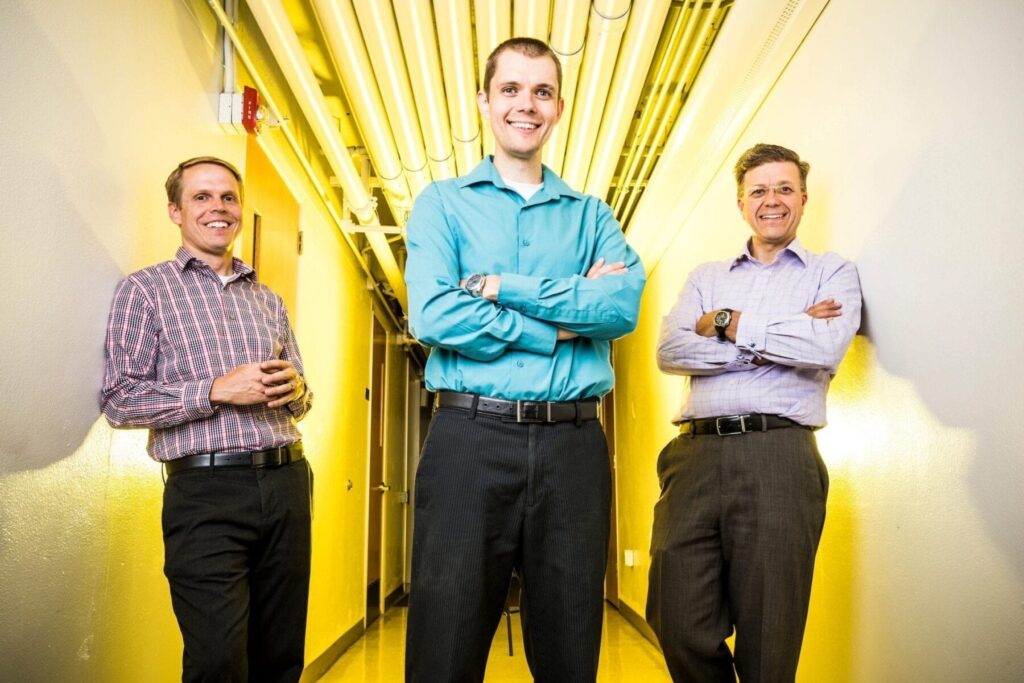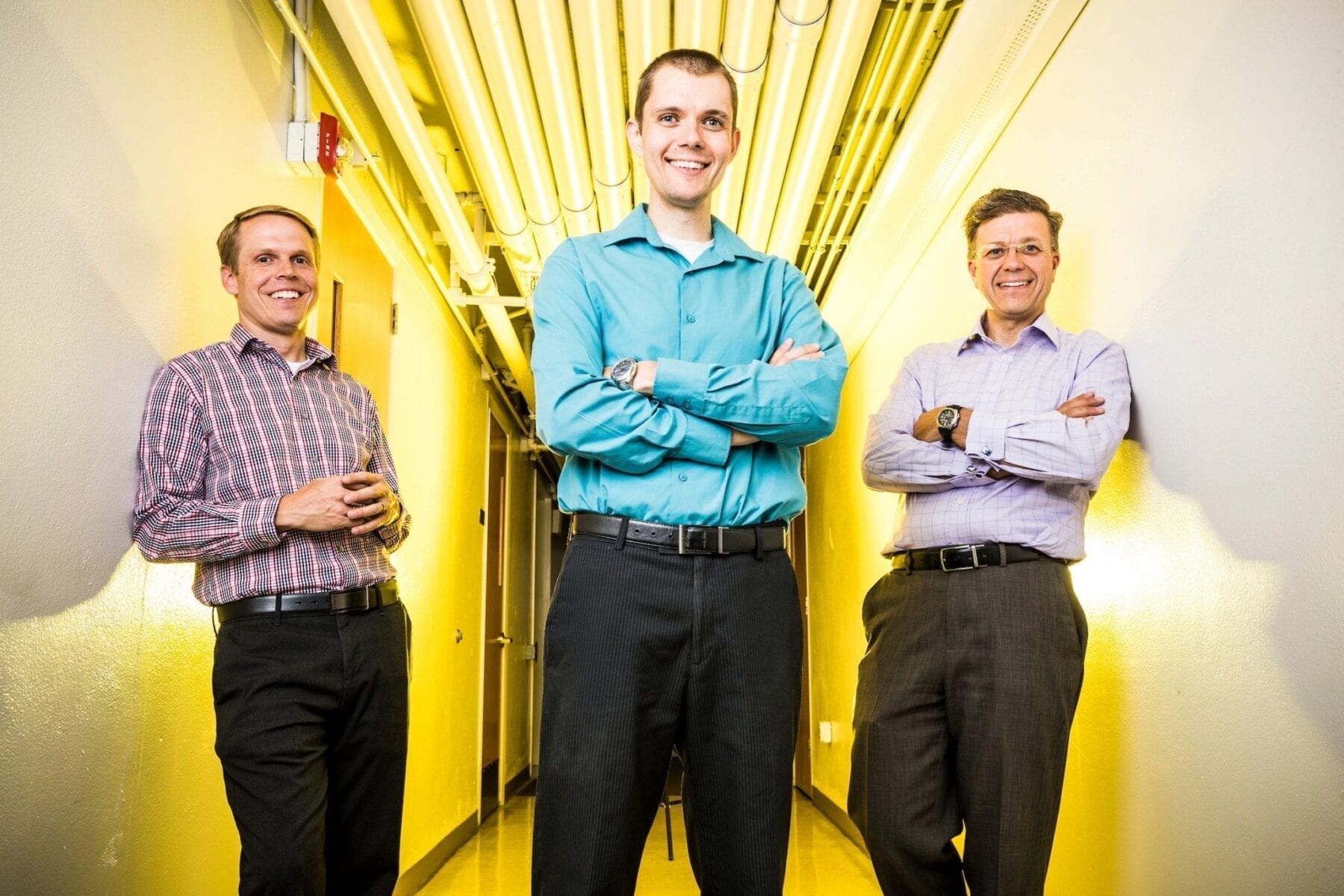
Interdisciplinary team cracks code to produce Mother Nature’s dictionary of atomic structures
It may not be as catchy as chains and weak links, but physicists and engineers know “a material is only as strong as its weakest grain boundary.”
OK, that’s not catchy at all, but here’s the point: grain boundaries are a big deal. They are the microscopic, disordered regions where atom-sized building blocks bind the crystals (i.e. grains) together in materials.
More importantly, grain boundaries help determine the properties of metals important to humans. For example, they can influence a metal’s strength (buildings!), corrosion resistance (bridges!) and conductivity (electricity!).
But while researchers have studied grain boundaries for decades and gained some insight into the types of properties grain boundaries produce, no one has been able to nail down a universal system to predict if a certain configuration of atoms at grain boundaries will make a material stronger or more pliable.
Enter the interdisciplinary BYU research team of Rosenbrock, Homer and Hart. The Ph.D. student (Conrad Rosenbrock) and two professors — one engineer (Eric Homer) and one physicist (Gus Hart) — might have cracked the code by juicing a computer with an algorithm that allows it to learn the elusive “why” behind the boundaries’ qualities.
Their method, published in the most recent issue of Nature journal Computational Materials, provides a technique to produce a “dictionary” of the atomic building blocks found in metals, alloys, semiconductors and other materials. Their machine learning approach analyzes Big Data (think: massive data sets of grain boundaries) to provide insight into physical structures that are likely associated with specific mechanisms, processes and properties that would otherwise be difficult to identify.
“We’re using machine learning, which means algorithms can see trends in lots and lots of data that a human can’t see,” Homer said. “With Big Data models you lose some precision, but we’ve found it still provides strong enough information to connect the dots between a boundary and a property.”
When it comes to metals, the process can evaluate properties like strength, weight and lifespan of materials, leading to the eventual optimization of the best materials. Although the group is not actually creating materials yet, they can now decipher the “why” and the “how” of the makeup.
Researchers said their paper is the first to attempt to crack the code of the atomic structures that heavily influence grain boundary properties with the computer algorithms of machine learning.
“It’s kind of like Siri; Siri works by taking sounds and turning them into vowels and consonants and ultimately words by accessing a massive Apple database,” Hart said. “We’re using the same concept. We have a large database, and our algorithm is taking grain boundaries and comparing it against that database to connect them to certain properties.”
The end goal is to make it easier and more efficient to develop materials that can be combined to make strong, lightweight and corrosion-free metals. The researchers believe they are at the front end of what could be a 10 or even 20-year process to create innovative alloy structures that provide practical solutions to major structures.
“Our nation spends $500 billion a year on corrosion,” Homer said. “If you can reduce the cost of treating corrosion even a few percent by developing more resistant metals, you can save billions every year. That’s not a small amount of money.”
Learn more: BYU researchers develop method that could produce stronger, more pliable metals
The Latest on: Corrosion-free metals
[google_news title=”” keyword=”corrosion-free metals” num_posts=”10″ blurb_length=”0″ show_thumb=”left”]- Comprehensive Guide to Steel Integrity: Preventing Corrosion and Ensuring Structural Safetyon April 26, 2024 at 7:29 am
Structural steel is a common choice for many industries, including concrete, buildings, architecture, construction, and infrastructure. Corrosion can cause safety issues like instability and other ...
- Car battery corrosion: causes and remedieson April 23, 2024 at 6:30 pm
Causes of corrosion Ronnie Kyazze, an automotive technician says oxidation – a chemical reaction that occurs when metal interacts ... “It is fast and hassle-free. Jelly can be applied ...
- Moment furious Alec Baldwin lashes out at anti-Israel protester who taunted Rust star ‘why did you kill that lady’on April 23, 2024 at 2:01 am
ALEC Baldwin has been caught lashing out at an anti-Israel protester after being taunted over the fatal shooting on the set of his new film Rust. Baldwin, 66, was recorded smacking the phone out ...
- Best Rust Converter & Remover: Options for Corrosion Protectionon April 18, 2024 at 5:00 pm
If you’ve ever faced years of rust and corrosion on metal parts, you know just how annoying it is to remove and how damaging it can be. Over time, rust can literally eat away at metal ...
- Fog fluid product highlighted to prevent corrosionon April 18, 2024 at 3:01 pm
Global corrosion protection company Cortec Corporation highlights that its CorroLogic VpCI-339 fogging fluid is fast, effective and convenient in addressing the challenges of void and corrosion in ...
- Graphene paints a corrosion-free futureon April 17, 2024 at 5:46 am
A thin layer of graphene paint can make impermeable and chemically resistant coatings which could be used for packaging to keep food fresh for longer and protect metal structures against corrosion, ...
- How to Fight Boiler Corrosionon April 17, 2024 at 2:15 am
The metal reacts chemically and disintegrates ... Contact Rasmussen Mechanical today to schedule a free consultation. FAQs About Boiler Corrosion 1. Can a corroded boiler be repaired? Yes, you can ...
- The best rust removers of 2024on April 12, 2024 at 2:00 am
Not only can these rust removers be used on your car, most are also great options for things like cast iron cookware, rusty metal tools and any other rusty surface. Here are the best rust removers ...
- Rust memory safety explainedon April 3, 2024 at 2:00 am
Other languages, like C, may run fast and close to the metal, but they lack the language ... from making it into production with Rust code. Use-after-free errors or "dangling pointers" emerge ...
- The importance of corrosion protection for electric vehicleson April 2, 2024 at 4:59 pm
Material Longevity: EVs often incorporate a variety of materials, including metals and alloys ... reduced energy transfer efficiency and overall performance. Ensuring corrosion-free connections is ...
via Google News and Bing News











